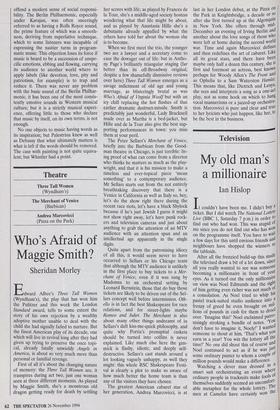Theatre
Three Tall Women (Wyndham's) The Merchant of Venice (Barbican) Andrea Marcovicci (Pizza on the Park)
Who's Afraid of Maggie Smith?
Sheridan Morley
dward Albee's Three Tall Women (Wyndham's), the play that has won him the Pulitzer and this week the London Standard award, tells to some extent the story of his own rejection by a wealthy adoptive mother unable to deal with the child she had signally failed to nurture. But the finest American play of its decade, one which will live in revival long after they had given up trying to preserve the once topi- cal, already fatally unwieldy Angels in America, is about so very much more than personal or familial revenge.
First of all it's about the changing nature of memory: the Three Tall Women are, it transpires during act two, just one woman seen at three different moments. As played by Maggie Smith, she's a monstrous old dragon getting ready for death by settling her scores with life; as played by Frances de la Tour, she's a middle-aged society hostess wondering what that life might be about, and as played by Anastasia Hille she's a debutante already appalled by what the others have told her about the woman she is to become.
When we first meet the trio, the younger two are a lawyer and a secretary come to ease the dowager out of life: but in Antho- ny Page's brilliantly triangular staging (far better than its off-Broadway original, despite a few shamefully dismissive reviews over here) Three Tall Women emerges as a savage indictment of old age and young marriage, as blisteringly brutal as was Who's Afraid of Virginia Woolf but with an icy chill replacing the hot flushes of that earlier dramatic destruct-missile. Smith is predictably just wonderful, Lady Bracknell made over as Martha is a bed-jacket, but Hille and de la Tour also give the best sup- porting performances in town: you miss them at your peril.
The Peter Sellars's Merchant of Venice, briefly into the Barbican from the Good- man theatre in Chicago, is just terrible: liv- ing proof of what can come from a director who thinks he matters as much as the play- wright, and that it is his mission to make a timeless and ever-topical piece 'mean something' to a contemporary audience. Mr Sellars starts out from the not entirely breathtaking discovery that there is a Venice in California as well as Italy so, hey, let's do the show right there during the recent race riots, let's have a black Shylock because if he's just Jewish I guess it might not show right away, let's have punk rock- ers and television cameras and just about anything to grab the attention of an MTV audience with an attention span and an intellectual age apparently in the single digits, Quite apart from the patronising idiocy of all this, it would seem never to have occurred to Sellars or his Chicago team that although the MTV audience is unlikely in the first place to buy tickets to a Mer- chant of Venice, even if it was sung by Madonna to an orchestral setting by Leonard Bernstein, those that do buy those tickets are likely to be driven out of the Sel- lars concept well before intermission. Oth- ello is in fact the best Shakespeare for race relations, and for street-fights maybe Romeo and Juliet. The Merchant is also about many other things undreamt of in Sellars's daft kiss-me-quick philosophy, and quite why Portia's prenuptial caskets should be turned into coffins is never explained. Like much else here the gim- mick is flashy, idiotic, and deeply self- destructive. Sellars's cast stands around a lot looking vaguely unhappy, as well they might: this whole RSC Shakespeare Festi- val is clearly a plot to make us aware of how much better the home team is than any of the visitors they have chosen.
The greatest American cabaret star of her generation, Andrea Marcovicci, is at last in her London debut, at the Pizza on the Park in Knightsbridge, a decade or so after she first turned up at the Algonquin in New York. She offers through mid- December an evening of Irving Berlin and another about the love songs of those who were left at home during the second world war. Time and again Marcovicci defines and then redefines the art of cabaret. Like all its great stars, and there have been maybe only half a dozen this century, she 15 first and foremost an actress, best known perhaps for Woody Allen's The Front and as Ophelia to a Sam Waterston Hamlet. This means that, like Dietrich and LenYa, she sees and interprets a song as a one-act play, not as some hook on which to hang vocal mannerisms or a jazzed-up orchestra- tion. Marcovicci is pure and clear and true to her lyricists who just happen, like her, to be the best in the business.










































































 Previous page
Previous page